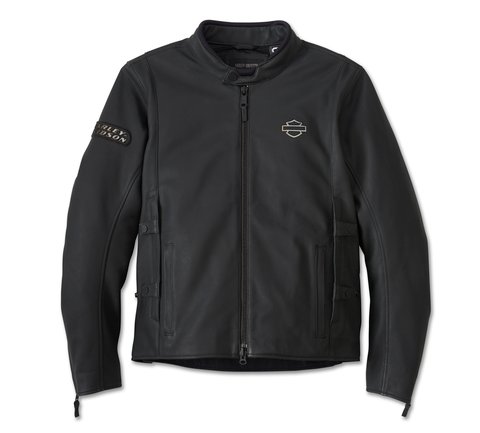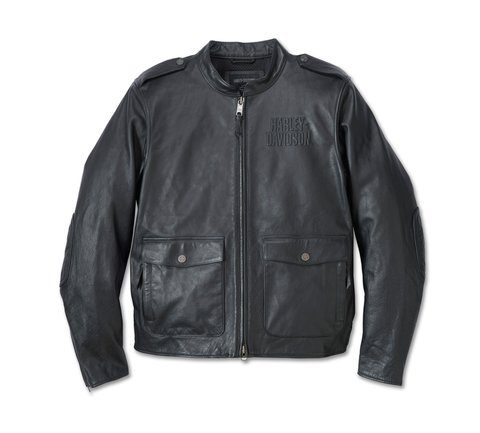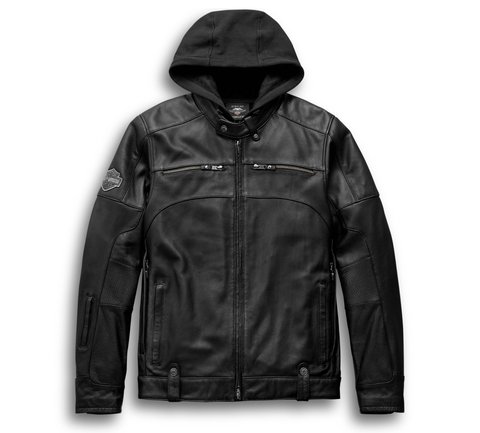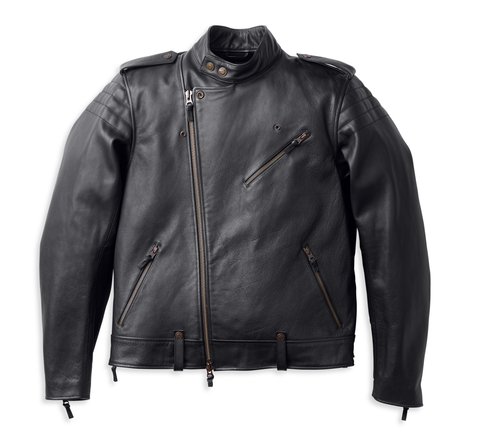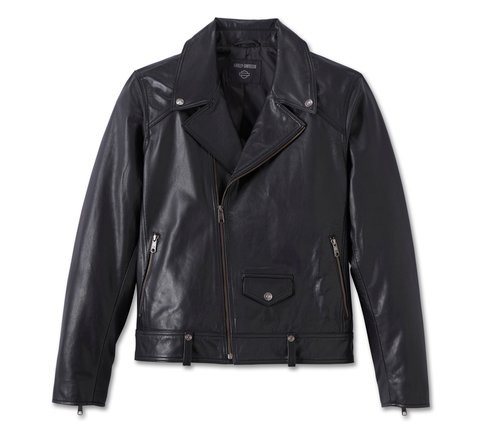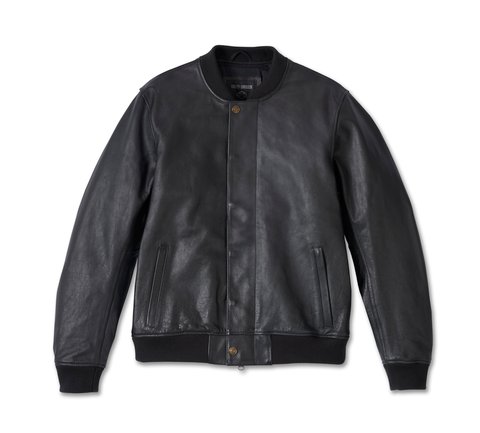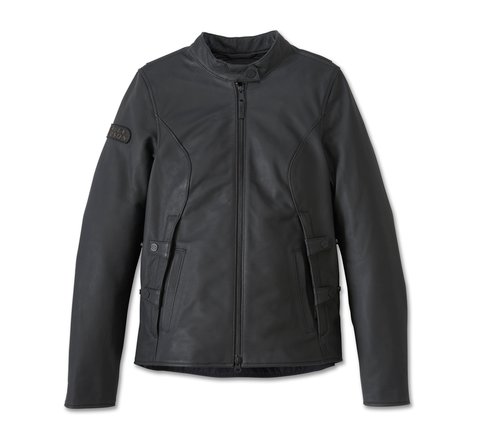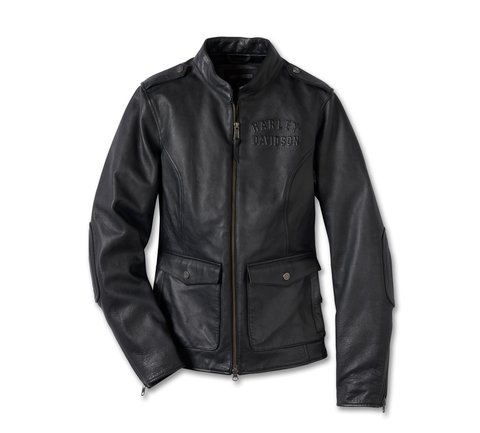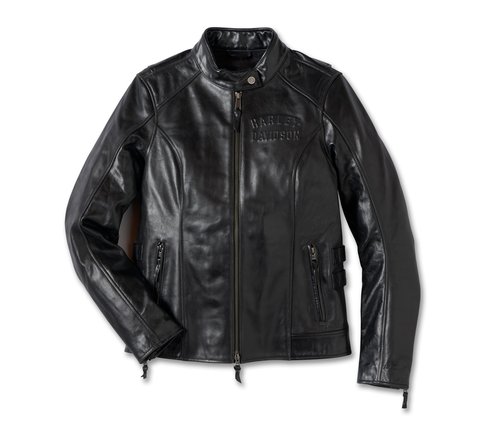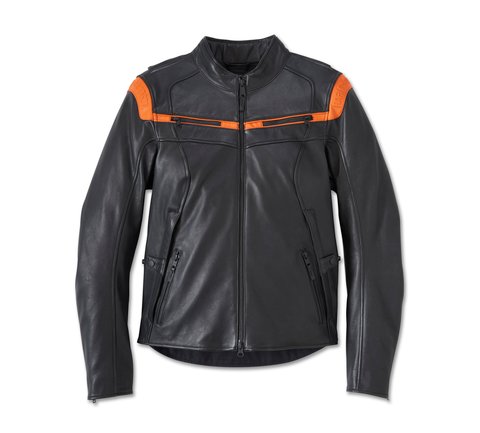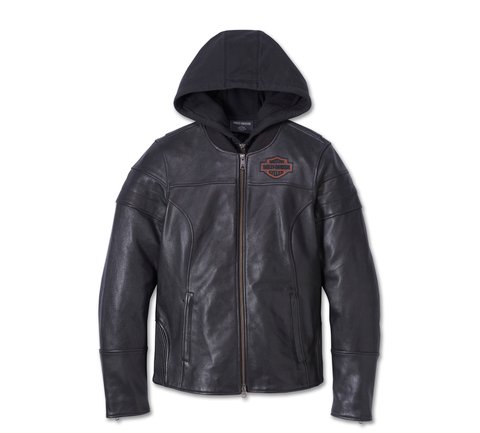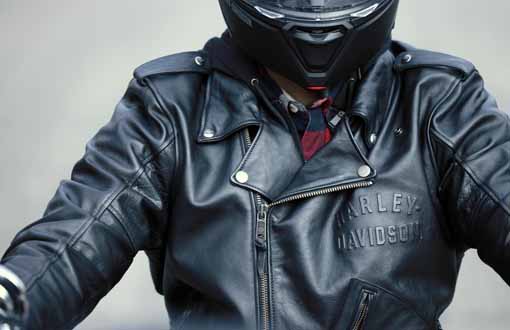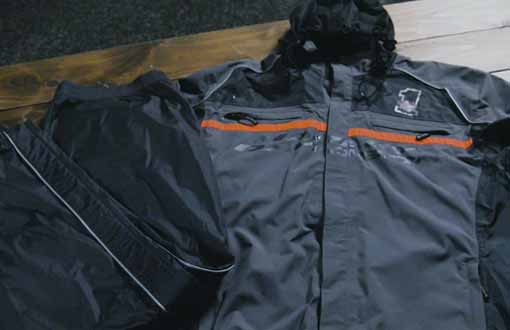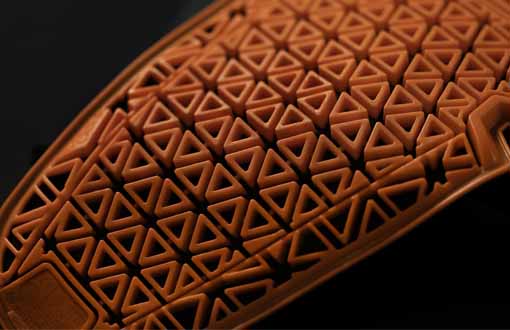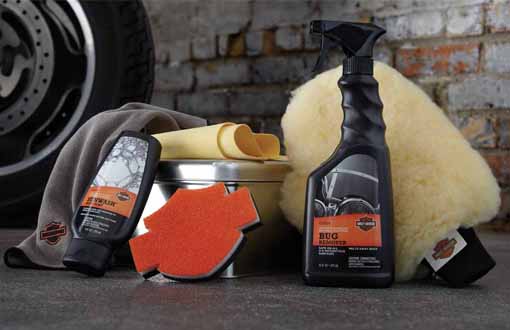How to Clean and Care for Your Leather Jacket
Comments CommentA leather jacket is one of the best (and coolest looking) ways to help protect yourself from the wind when riding your Harley-Davidson® motorcycle. It’s an iconic accessory bikers have loved for decades, specifically for its longevity and quality.
Knowing how to clean a leather jacket is one of the most important parts of owning one. Routine care and step-by-step cleaning methods can help your leather last for decades. Knowing how to handle stains quickly can prevent potentially costly damage or repairs.
Let’s look at how to keep your leather in riding shape for years to come.
Understanding Different Types of Leather
Not all leather jackets are created equal. Treating them like they are can lead to damage. The type of material determines how to care for your leather jacket. It’s essential to identify what you’re working with before you apply any products or cleaners to it.
The main types of leather you’ll find when shopping for a leather jacket include:
- Full-grain leather: The most durable and natural-looking leather has an unaltered surface that develops a rich patina (read: sheen) over time. It benefits from occasional conditioning to prevent drying and cracking.
- Top-grain leather: This slightly refined leather has a sanded surface to remove imperfections while maintaining strength. Top-grain leather requires conditioning, but it’s more resistant to stains than full-grain.
- Suede and nubuck: These leathers have softer, velvety textures that increase their vulnerability to moisture and stains. Never treat these types of leather with water or conventional cleaners. Instead, invest in a good suede brush and specialized erasers to remove dirt. You can also use a protective spray to add a barrier against stains.
Choosing an appropriate care method starts with knowing your jacket’s leather type. What works for one might damage another, so clearly and carefully examine care labels on your jacket or consult professionals when in doubt.
General Maintenance Tips for Leather Jackets
Keeping your leather jacket in top shape doesn’t require constant upkeep. Regular care can help prevent wear and tear. These simple habits can extend a jacket’s lifespan and keep it looking road-ready.
Wipe down your jacket regularly. Dust and dirt can accumulate over time and damage your jacket. Depending on the type of leather, a dry or slightly damp microfiber cloth can remove surface debris without damaging it.
Re-condition it every few months. Leather is skin, after all. That means it can lose moisture and develop cracks. Applying a quality leather conditioner every few months can keep it supple.
Store the jacket properly. Skip throwing it over a chair or cramming it into tight spots in your closet. Hanging your jacket on a sturdy, padded hanger helps maintain its shape.
Keep leather away from heat and sunlight. Direct exposure to sunlight and heat may cause fading and drying. When you’re not riding, store your jacket in a cool, dry place to prevent damage.
Avoid plastic covers. Leather needs to breathe. Instead of plastic, opt for a breathable garment bag that protects it from dust while allowing airflow.
Clean spills immediately. Blot liquids with a soft cloth. Do not rub. For oil stains, sprinkle cornstarch and let it absorb before you brush it off.
The right routine will keep your leathers soft, flexible, and free from premature aging.
What Not to Do When Cleaning Leather Jackets
The right care practices can preserve your leather for years. Cleaning it the wrong way can wreck it and cause permanent damage. Avoid these common mistakes to keep your jacket in its best condition.
DON’T soak leather jackets in water. Leather absorbs water quickly. That can lead to stiffness, discoloration, and even mold growth. If your jacket gets wet, blot it dry with a soft cloth and let it air-dry naturally. Never use direct heat sources.
DON’T use harsh cleaners. Household cleaners like bleach, ammonia, and alcohol-based solutions will strip leather of its natural oils. That can lead to dryness, cracking, and fading. Use leather-specific cleaners or a mild soap solution if necessary.
DON’T use abrasive tools. A rough brush or scrubbing pad will scratch the surface of your jacket and remove its natural finish. Stick to microfiber cloths, soft sponges, or specialized suede brushes for gentle cleaning.
DON’T dry leather jacks in heat or sunlight. Exposing leather to high heat speeds up deterioration. If your jacket needs drying, leave it in a well-ventilated spot away from radiators, heaters, or direct sunlight.
Ultimately, mistreating your leather jacket may shorten its lifespan. The best way to clean and care for it is to do so with patience and the right materials. Rushing the process almost always leads to damage.
Step-by-Step Guide to Cleaning a Leather Jacket at Home
Knowing how to clean a leather jacket takes practice, but it doesn’t have to be expensive. With the right approach, you can remove dirt and minor stains without damaging the leather’s texture and finish. Follow these steps to clean your jacket safely at home:
Dust the Jacket with a Soft Cloth
Remove surface dust and debris with a dry microfiber cloth. Gently wipe down the whole jacket. If you find embedded dirt in the creases or seams, a soft-bristled brush can help loosen it. This step helps to prevent grime from settling into the leather when cleaning deeper.
Spot Clean Small Stains with a Damp Cloth and Mild Soap
For minor stains, mix a small amount of mild dish soap with lukewarm water. Dampen—but don’t soak—a soft cloth and gently blot the stain. Avoid scrubbing. This can spread the stain or damage the finish. Once the stain has been lifted, wipe the area with a clean cloth to remove any remaining soap residue.
Gently Wipe Down the Entire Jacket
Should the entire jacket need cleaning, dampen a microfiber cloth with the same soap solution and lightly wipe the surface. Work in sections and use smooth, circular motions. Don’t oversaturate the leather. Excess moisture leads to warping or discoloration. Once you’re done, wipe it again with a separate cloth to remove soap residue.
Apply Leather Conditioner
After your jacket is dry, apply a small amount of leather conditioner with a clean, soft cloth. Massage it in with circular motions to ensure an even layer. This step restores moisture and keeps the leather soft, preventing cracks. Allow the conditioner to absorb fully before you wear or store the jacket.
Ultimately, mistreating your leather jacket may shorten its lifespan. The best way to clean and care for it is to do so with patience and the right materials. Rushing the process almost always leads to damage.
Cleaning the Inside of Your Leather Jacket
You can’t really wash a leather jacket, but the inside of the jacket can trap sweat, body oils, and odors over time. That means the lining needs some TLC, too. Here’s how you can freshen it up without damaging the fabric.
Prepare A Gentle Cleaning Solution
Mix lukewarm water and a few drops of mild detergent or baby shampoo. Harsh cleaners can weaken delicate fabric linings like silk or polyester. Dampen a soft cloth with the solution, taking care that it’s not too wet.
Spot Clean Sweat Stains
Focus on areas that come into direct contact with skin like the collar, cuffs, or underarms. Gently blot these areas with your damp cloth to lift sweat and oil buildup. Stubborn stains might require some extra effort. A small amount of white vinegar diluted with water can help break them down.
Wipe Down the Entire Lining
For a complete refresh, turn your jacket inside out and lightly wipe its lining with a damp cloth. Work in sections to ensure an even cleaning. Don’t soak the fabric. Excess moisture could cause mildew or water spots.
Deal with Unpleasant Odors
If the jacket smells musty, let it air out in a well-ventilated space. Lingering odors may require a light misting with a fabric refresher or a mixture of water or vinegar. You can even hang the jacket with a sachet of baking soda or activated charcoal. This can absorb unwanted smells.
How to Handle Tough Stains on Leather Jackets
Some stains require extra care to remove without damaging your jacket’s finish. While you can treat minor marks at home, deep-set stains may need professional attention.
Grease Stains
Oil and grease can set into leather quickly, which makes them tough to remove. The trick? Absorbing the grease before it sets.
To treat grease stains:
- Sprinkle cornstarch or talcum powder directly on the stain.
- Let it sit for several hours or overnight. The powder will draw out the grease.
- Gently brush the residue from the jacket with a soft cloth.
- Repeat as necessary until the stain disappears.
Don’t rub the stain, as this can spread the oil deeper into the leather.
Ink Stains
Ink stains can become permanent if you leave them untreated. Act quickly.
To treat ink stains:
- Ink stains can become permanent if you leave them untreated. Act quickly.
- Lightly dab the stain. Don’t rub. Rubbing causes smudging.
- Once the ink starts to lift, wipe the area with a clean, damp cloth.
- Follow up with a leather conditioner to restore moisture.
Tip: Test alcohol in an inconspicuous spot first. Some leathers are extra sensitive and may discolor.
Water Stains
Water might seem harmless, but uneven drying can leave unsightly marks.
To treat water stains:
- Lightly dampen a clean cloth with water and gently wipe over the stain to blend it with the surrounding leather.
- Immediately dry the jacket on a soft towel.
- Let it air dry naturally. Don’t use a heat source like a lamp or hair dryer.
- If necessary, apply a leather conditioner afterward to prevent stiffness.
Don’t rub the stain, as this can spread the oil deeper into the leather.
When to Seek Professional Cleaning
If the stain persists after multiple attempts or affects a large area, professional cleaning is your best option. Leather specialists can use treatments to remove stains without compromising your jacket’s integrity. Aggressive DIY damage can do more harm than good. When in doubt, leave it to the experts.
How to Use Leather Cleaner
- Choose the right product. Avoid harsh chemicals or excessive water.
- Apply a small amount. Dampen a microfiber cloth with the cleaner or apply a small drop to the cloth. Never pour cleaner directly on the jacket.
- Work in sections. Use gentle motions to rub the cleaner into the leather. Focus on high-contact areas like sleeves or collars.
- Buff off the excess. Use a dry microfiber cloth to wipe away the remaining cleaner to prevent buildup.
- Let it dry naturally in a well-ventilated area before you apply the conditioner.
Leather-specific cleaning products lift dirt and stains without stripping away the leather’s natural oils. Unlike household cleaners, these maintain the material’s flexibility and finish. Applying them the right way ensures a thorough clean without damage.
How to Store Your Leather Jacket Properly
Proper storage is vital. Incorrect storage can lead to creases, mold, or other permanent damage. Use a sturdy hanger with padding or wide shoulders to keep it from sagging. Wire hangers can distort its shape.
If you need to use a cover, opt for a breathable fabric garment bag that you can store in a cool, dry place. Give it plenty of space to breathe. Airflow helps prevent wrinkles and keeps your jacket from absorbing smells from other clothes.
Caring for Your Leather Jacket: A Worthwhile Investment
Taking care of your leather jacket means it can last a long time. Even the best leather motorcycle jackets require routine upkeep and cleaning. Avoiding harsh cleaners, keeping it dry, and avoiding exposure to heat and sunlight when off the road can keep the leather of your jacket supple and soft for years to come and comfortable for your next ride.
FAQs About Cleaning Leather Jackets
How can I clean my leather jacket at home?
Clean your leather jacket at home lightly with a microfiber cloth. For stains, use a damp cloth with mild soap and blot gently. Cleaning the entire jacket may require gently wiping it down with a damp cloth. Apply leather conditioner afterward to restore softness.
How do you clean leather without ruining it?
The key to cleaning leather without ruining it is to use gentle, leather-specific products and avoid excess water. Never use household cleaners. Try to use soft cloths or sponges. Never apply more product than you need. Always test your cleaner in a small area before you treat larger sections.
Can leather jackets be machine-washed?
No! The combination of water, detergent, and agitation will weaken the material and cause stiffness, cracking, and shrinking. If your leather jacket needs deep cleaning, take it to a professional.
How do I fix scratches on my jacket?
Minor scratches can be repaired by gently rubbing with a soft cloth and a small amount of conditioner. That can help blend the scratch into the surrounding leather. Deeper scratches might require a leather repair kit or professional restoration to fill the damage and restore the surface.
With these tips, you can keep your Harley Davidson leather jacket looking factory fresh. But if you’re searching for even more insights or help with maintaining or replacing your leather jacket, look no further than your local Harley-Davidson® dealer, where our experts are standing by to help you.

